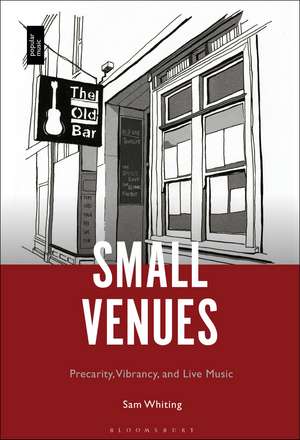Small Venues: Precarity, Vibrancy and Live Music
Autor Dr. Sam Whitingen Limba Engleză Hardback – 6 sep 2023
Preț: 497.64 lei
Preț vechi: 688.61 lei
-28% Nou
Puncte Express: 746
Preț estimativ în valută:
95.22€ • 99.42$ • 78.81£
95.22€ • 99.42$ • 78.81£
Carte tipărită la comandă
Livrare economică 04-18 aprilie
Preluare comenzi: 021 569.72.76
Specificații
ISBN-13: 9781501379888
ISBN-10: 1501379887
Pagini: 240
Dimensiuni: 152 x 229 mm
Greutate: 0.49 kg
Editura: Bloomsbury Publishing
Colecția Bloomsbury Academic
Locul publicării:New York, United States
ISBN-10: 1501379887
Pagini: 240
Dimensiuni: 152 x 229 mm
Greutate: 0.49 kg
Editura: Bloomsbury Publishing
Colecția Bloomsbury Academic
Locul publicării:New York, United States
Caracteristici
Discusses the relevance and significance of alternative forms of capital--cultural, social, symbolic--within small venue spaces and across the live music sector
Notă biografică
Sam Whiting is a Lecturer in Creative Industries at the University of South Australia. His research is primarily focused on issues of capital, labour, and value as they relate to music scenes, the creative industries, and the cultural economy more broadly. Dr. Whiting's published work explores issues of access, identity, gender, heritage, live music, cultural policy, and music scenes through the interdisciplinary lens of cultural studies, sociology, and popular music studies.
Cuprins
Part 1: Live Music and Small VenuesIntroduction1. Theorizing Live Music 'Scenes', 'Subcultures' and the 'Live Music Ecology'Part 2: Vibrancy2. Live Music and the City3. Place, Space and Small VenuesPart 3: Precarity4. Capital, Value and Cultural IntermediariesConclusionReferencesIndex
Recenzii
Whiting's book is a long overdue and critical addition to research on the spaces and places of live music performance and consumption. Small venues are often referred to in passing but rarely a sustained focus in academic scholarship; and yet, as this book masterfully illustrates, they are the lifeblood of local and trans-local music scenes. Crucial reading for anyone who is interested in gaining a deeper knowledge of the social, economic and emotional value of small venues, the challenges they face and the unequivocal part they have played in keeping music "live" for successive generations of music fans around the world.
Small venues are the lifeblood of any music scene: a heady mix of sights, smells and sounds; spaces full of creativity and pleasure, ambition and rivalry; sites where the artistic expression, profit motives and government regulations come in to conflict. Without small venues there is no place for experimentation and failure. Without small venues nothing can develop to fill the larger venues. Sam Whiting's exploration of these key sites of cultural production and consumption is a must read for any scholars interested in the historic importance of these vital spaces, their relation to sense of place, taste, desires and belonging, and governmental aspects that frustrate artistic endeavours. But most importantly, Small Venues illuminates how precarity and vibrancy, that is, social aspects of the way these spaces feel, are central to the success or closure of venues and therefore whether a creative scene thrives or dies. Bringing together cultural sociology and cultural studies analysis with his own industry experiences and a sharp antenna for bullshit, Whiting's Small Venues is an important and evocative intervention into the scholarship of music ecosystems and scenes.
This is a welcome and timely study of live music ecologies, made more so by the impact of the pandemic on music-making around the world. Whiting has offered us a cogent study of small venues, for contributions to not only music scenes but also the larger creative cultures within which they exist.
Small venues are the lifeblood of any music scene: a heady mix of sights, smells and sounds; spaces full of creativity and pleasure, ambition and rivalry; sites where the artistic expression, profit motives and government regulations come in to conflict. Without small venues there is no place for experimentation and failure. Without small venues nothing can develop to fill the larger venues. Sam Whiting's exploration of these key sites of cultural production and consumption is a must read for any scholars interested in the historic importance of these vital spaces, their relation to sense of place, taste, desires and belonging, and governmental aspects that frustrate artistic endeavours. But most importantly, Small Venues illuminates how precarity and vibrancy, that is, social aspects of the way these spaces feel, are central to the success or closure of venues and therefore whether a creative scene thrives or dies. Bringing together cultural sociology and cultural studies analysis with his own industry experiences and a sharp antenna for bullshit, Whiting's Small Venues is an important and evocative intervention into the scholarship of music ecosystems and scenes.
This is a welcome and timely study of live music ecologies, made more so by the impact of the pandemic on music-making around the world. Whiting has offered us a cogent study of small venues, for contributions to not only music scenes but also the larger creative cultures within which they exist.
